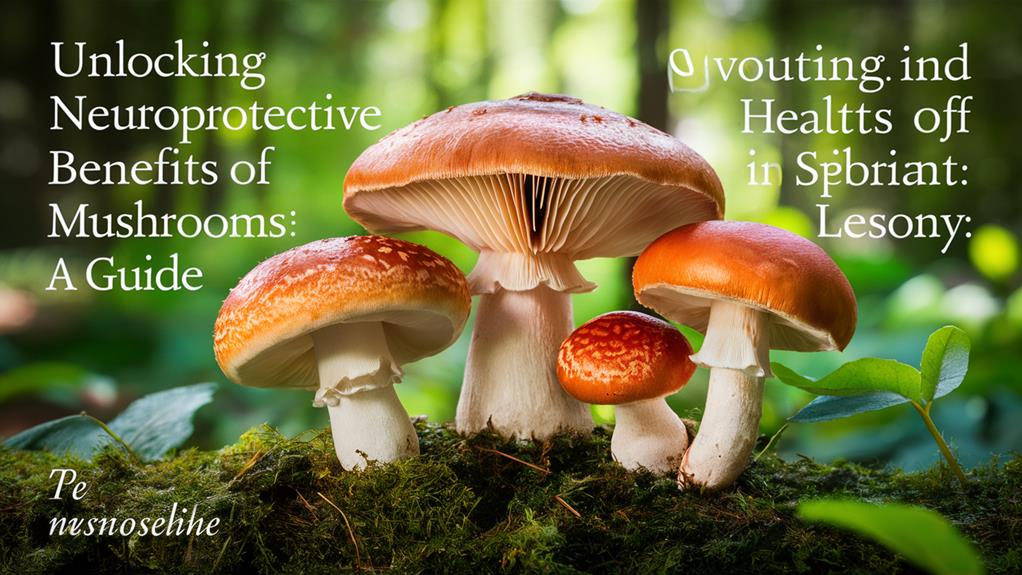
Mushrooms, such as Lion's Mane, Shiitake, and Reishi, are packed with neuroprotective properties that can boost your brain health. Regularly eating mushrooms can improve cognitive function and potentially cut your risk of mild cognitive impairment by 50%. They contain bioactive compounds like ergothioneine and beta-glucans, which protect your brain from oxidative stress and reduce inflammation. Incorporating mushrooms into your meals is simple and enjoyable—try adding them to stir-fries or smoothies. By understanding their benefits and exploring more varieties, you can enhance your cognitive wellness and overall mental clarity. There's plenty more to discover about these remarkable fungi.
Neuroprotective Properties of Mushrooms

Mushrooms, particularly varieties like Lion's Mane, offer impressive neuroprotective properties that can directly impact your cognitive health.
These fungi help enhance cognitive function and memory retention by boosting brain-derived neurotrophic factor (BDNF), which supports neuronal growth and repair. Research shows that consuming over two cups of mushrooms weekly can reduce your risk of mild cognitive impairment (MCI) by 50%, highlighting their protective role in maintaining brain health.
Additionally, regular consumption of Lion's Mane has been linked to improved cognitive performance and enhanced memory, making it a potent ally for brain health.
The neuroprotective effects of bioactive compounds found in mushrooms, such as erinacines and hericenones, play a crucial part in their neuroprotective effects. They promote nerve regeneration and combat cognitive decline, making mushrooms a valuable addition to your diet.
Varieties like Reishi and turkey tail are also beneficial, thanks to their adaptogenic properties that help your brain manage stress, improving mood and reducing cognitive fatigue.
Key Bioactive Compounds
Several key bioactive compounds in mushrooms play a vital role in promoting brain health and protecting against cognitive decline. For instance, polysaccharides like beta-glucans not only enhance your immune system but also exhibit neuroprotective properties. They promote neuronal growth and help reduce inflammation, making them essential for brain function.
Additionally, medicinal mushrooms like Reishi and Lion's Mane are known for their rich nutrient profiles that contribute to cognitive health. Ergothioneine, an amino acid found in many mushrooms, acts as a potent antioxidant. It protects your brain cells from oxidative stress and cellular damage, which are major contributors to neurodegenerative diseases.
Additionally, Lion's Mane mushrooms contain hericenones and erinacines, compounds linked to increased levels of brain-derived neurotrophic factor (BDNF). BDNF is crucial for maintaining cognitive function and supporting neuronal health.
You'll also find phenolic compounds, including flavonoids and terpenes, that contribute to the neuroprotective effects of mushrooms by modulating inflammatory pathways. Regularly consuming mushrooms rich in these bioactive compounds can lead to significant improvements in your cognitive function and a reduced risk of neurodegenerative diseases.
Mechanisms of Action

Mushrooms are packed with powerful compounds that can really benefit your brain. They help reduce inflammation, protect against oxidative stress, and promote neuroprotection, all of which play a crucial role in maintaining cognitive health.
For instance, chaga mushrooms are known to contain high levels of beta-glucans that enhance immune defense, which can indirectly support brain health by maintaining overall wellness immune system support.
Additionally, their rich antioxidant properties combat oxidative stress, further safeguarding brain function.
Antioxidant Properties
When you think about brain health, the role of antioxidants can't be overlooked, especially when it comes to mushrooms. These amazing fungi are packed with bioactive compounds like ergothioneine and phenolic compounds, which have strong antioxidant properties. They effectively reduce oxidative stress, a condition where free radicals damage your cells, including those in your brain. By scavenging these free radicals, mushrooms help protect neuronal health and support overall brain function.
Additionally, specific polysaccharides found in mushrooms, such as beta-glucans, enhance your body's antioxidant defenses. Regularly consuming mushrooms may lead to a significant reduction in markers of oxidative stress, which lowers the risk of neurodegenerative diseases.
The antioxidant mechanisms in mushrooms also involve modulating signaling pathways related to inflammation and apoptosis—the processes that can harm your neurons if not properly regulated.
Incorporating mushrooms into your diet isn't just tasty; it's a smart step toward neuroprotection. By harnessing their powerful antioxidant properties, you can help maintain the health of your brain and promote long-term cognitive function.
Neuroprotective Compounds
Building on their strong antioxidant properties, mushrooms also contain various neuroprotective compounds that contribute to brain health. These bioactive compounds, like ergothioneine and hericenones, help protect neurons from oxidative stress. They promote neuronal growth by activating brain-derived neurotrophic factor (BDNF), crucial for maintaining healthy brain cells.
Additionally, polysaccharides found in mushrooms, such as β-glucans, play a vital role in modulating the immune response. By reducing neuroinflammation, these compounds can help combat neurodegenerative diseases.
Mushrooms like Lion's Mane (Hericium erinaceus) are particularly known for their neuroprotective effects. They enhance cognitive function and memory retention by stimulating the production of Nerve Growth Factor (NGF), which is essential for neuron survival.
Certain terpenoids in mushrooms, like those found in Reishi (Ganoderma lucidum), exhibit antioxidant properties that help prevent mitochondrial dysfunction, a significant factor in neurodegenerative processes.
Research shows that regularly consuming mushrooms, especially varieties like Shiitake and Oyster, is linked to a reduced risk of mild cognitive impairment (MCI) by up to 50%. By including mushrooms in your diet, you can take proactive steps toward supporting your brain health.
Inflammation Reduction
Reducing inflammation is crucial for maintaining brain health, and certain bioactive compounds in mushrooms can play a significant role in this process. Mushrooms contain powerful substances like polysaccharides and phenolic acids that help lower neuroinflammation, which is often linked to cognitive decline.
By consuming mushrooms, you can benefit from antioxidants like ergothioneine, which protects neurons from oxidative stress and inflammation, supporting overall brain health.
Research shows that specific mushrooms, such as Lion's Mane and Reishi, can modulate inflammatory pathways. They lower the levels of pro-inflammatory cytokines like TNF-α and IL-6, which are known to contribute to neurodegenerative conditions.
The immunomodulatory effects of these mushrooms enhance your body's ability to regulate inflammation, potentially preventing diseases like Alzheimer's.
Regularly eating mushrooms has been associated with reduced inflammation markers in the body, suggesting they offer a protective effect against age-related cognitive decline and neuroinflammatory diseases.
Clinical Evidence and Studies
When it comes to the clinical evidence surrounding mushrooms and brain health, several exciting studies stand out.
Research has identified neuroprotective compounds in mushrooms, like Lion's Mane and ergothioneine, which can improve cognitive function and fight oxidative stress.
Additionally, long-term studies suggest that regularly consuming mushrooms might support overall brain health and reduce the risk of cognitive decline as you age.
Neuroprotective Compounds Identified
You might be surprised to learn that certain mushrooms harbor compounds with remarkable neuroprotective properties. For instance, Lion's Mane mushroom, known scientifically as Hericium erinaceus, contains bioactive compounds like erinacines and hericenones. These compounds not only improve cognitive function but also support mental health by promoting the production of brain-derived neurotrophic factor (BDNF). This factor is crucial for neuronal growth and health.
Clinical studies reveal that consuming over two cups of mushrooms weekly can reduce the risk of mild cognitive impairment by up to 50%. Varieties such as shiitake and oyster mushrooms also show significant neuroprotective benefits.
Additionally, the adaptogenic properties of Reishi mushroom (Ganoderma lucidum) can help your brain manage stress, potentially enhancing mental clarity and reducing cognitive fatigue.
Fungal bioactives, including polysaccharides and phenolic compounds, play a significant role in modulating the immune response. They also exhibit potential antidepressant and anxiolytic effects, further emphasizing their importance in supporting mental health.
Cognitive Function Improvement Studies
Recent studies have shed light on the cognitive function improvement linked to mushroom consumption, revealing compelling evidence that certain varieties can significantly enhance brain health. A noteworthy study from Singapore found that eating over two cups of mushrooms weekly can reduce the risk of mild cognitive impairment (MCI) by 50%. This highlights the neuroprotective effects of mushrooms in promoting mental health.
Lion's Mane mushroom, in particular, has gained attention for its ability to boost cognitive function and memory retention. Research shows it increases levels of brain-derived neurotrophic factor (BDNF), which supports neuronal growth. Clinical trials also indicate that compounds like hericenones and erinacines in mushrooms may stimulate the production of nerve growth factors, further enhancing cognitive health.
Moreover, a systematic review suggests that adding mushrooms like Reishi, Turkey Tail, and Shiitake to your diet can improve mood and reduce cognitive fatigue, thanks to their adaptogenic properties.
Preliminary clinical evidence supports that regularly consuming mushrooms rich in bioactive compounds may lead to better cognitive outcomes and a lower risk of neurodegenerative diseases. By incorporating mushrooms into your diet, you could unlock significant benefits for your brain.
Long-term Brain Health Research
Long-term brain health research increasingly highlights the promising role of mushrooms in protecting cognitive function as we age. A study conducted in Singapore found that eating over two cups of mushrooms weekly cut the risk of mild cognitive impairment (MCI) by 50%. This shows just how beneficial mushrooms can be for brain health.
Lion's Mane mushroom stands out for its ability to stimulate the production of brain-derived neurotrophic factor (BDNF), vital for neuronal growth and cognitive function improvement. Clinical studies reveal that bioactive compounds in mushrooms, like ergothioneine and polysaccharides, have neuroprotective properties that may slow cognitive decline linked to the aging process.
Moreover, ongoing research is diving into other mushroom varieties, such as Reishi and Turkey Tail, to see how they might boost mood and reduce cognitive fatigue, hinting at their role in mental health support.
Although findings are promising, a systematic review of existing studies highlights the need for larger-scale clinical trials to confirm these cognitive benefits and neuroprotective effects. As you explore the world of mushrooms, consider how they could contribute to your long-term brain health.
Integrating Mushrooms Into Diet

Often, integrating mushrooms into your diet is easier than you might think. These versatile fungi not only add flavor but also come packed with health benefits, including neuroprotective properties.
You can start by adding cooked varieties like shiitake, oyster, or Lion's mane to your favorite dishes. Here are some simple ideas:
- Toss mushrooms into stir-fries for a savory twist.
- Blend mushroom powders into smoothies or coffee for a nutrient boost.
- Create delicious mushroom burgers or risottos that impress family and friends.
- Try mushroom tinctures for concentrated health benefits every day.
Consuming more than two cups of mushrooms weekly could reduce the risk of mild cognitive impairment (MCI) by 50%, thanks to their rich nutrients like ergothioneine and beta-glucans.
This makes integrating mushrooms into your meals not just a culinary adventure but a smart choice for your overall health. So, whether you're sautéing them with vegetables or stirring them into soups, you'll find that mushrooms are a simple way to enhance both flavor and nutrition.
It's time to embrace these amazing fungi for a healthier, happier you!
Future Research Directions
As we look ahead, the future of mushroom research holds exciting potential for uncovering new neuroprotective benefits.
Scientists are particularly interested in specific species like Lion's Mane and Reishi, which might enhance cognitive function and help reduce neurodegenerative risks. To truly understand their effectiveness, we need extensive human clinical trials that assess the safety and impact of various mushroom bioactive compounds on conditions such as mild cognitive impairment and Alzheimer's disease.
Moreover, researchers should explore the synergistic effects of mushroom extracts combined with other natural compounds. This could lead to innovative therapeutic strategies for mental health and cognitive disorders.
There's also a wealth of lesser-known mushroom species waiting to be studied. These could reveal new bioactive compounds that contribute to mycotherapy and expand treatment options for neurodegenerative diseases.
Conclusion
In conclusion, embracing mushrooms in your diet could be a delightful way to support your brain health. These fungi, often overlooked, hold remarkable neuroprotective properties thanks to their unique compounds. By integrating them into your meals, you're not just adding flavor but also giving your brain a helping hand. As research continues to unfold, the benefits of mushrooms may reveal even more exciting possibilities for our cognitive well-being, making it a journey worth exploring together.
